| Srl | Item |
| 1 |
ID:
022616
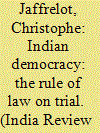

|
|
|
|
|
| Publication |
Jan 2002.
|
| Description |
77-121
|
| Summary/Abstract |
The unprecedented rise of corruption and the criminalization of politics in India are a threat to her democratic regime. This development is not due to the personality of the key figures of post-independence India, but stems from socioeconomic and political conditions: the "licence raj" led businessmen to bribe bureaucrats and politicians to get their projects cleared; its dismantlement under Delhi's economic liberalization policy generates even more corruption since the Indian economy offers more revenue-making opportunities. Besides the impact of these changing economic structures, the rising cost of elections under an ever competitive policy increases the politicians' search for money. However, the rule of law still has defenders. India has a robust judiciary and a virtually independent Election Commission. The "judicial activism" on which the former embarked in the 1990s has certainly made some impact. The Election Commission has also seriously pursued its role of protecting the public scene from the gangrene of crime.
|
|
|
|
|
|
|
|
|
|
|
|
|
|
|
|
| 2 |
ID:
067123
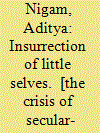

|
|
|
|
|
| Publication |
New Delhi, Oxford University Press, 2006.
|
| Description |
x, 351p.
|
| Standard Number |
0195676068
|
|
|
|
|
|
|
|
|
|
|
|
Copies: C:1/I:0,R:0,Q:0
Circulation
| Accession# | Call# | Current Location | Status | Policy | Location |
| 050479 | 320.5/NIG 050479 | Main | On Shelf | General | |
|
|
|
|
| 3 |
ID:
022615
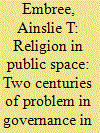

|
|
|
|
|
| Publication |
Jan 2002.
|
| Description |
54-76
|
| Summary/Abstract |
This article examines historical developments over the past 200 years, but especially in the nineteenth century, that provide the background and context for defining the relationship between the state and religious institutions in modern India. That relationship was described by the British government of India as a policy of neurality and non-interference; the declaration in India's Constitution that India is a secular state appears to be a reiteration of this position. Yet the acrimonious discussion surrounding the meaning of "secular" in contemporary India indictes that the issue is far more complex. Early manifestations of this issue can be traced to contradictorary pressures on India's British rulers. Christian groups objected to the East India Company continuing the policy of the former Muslim rulers of giving support to Hindu and Muslim religious institutions, and to the Company's refusal to permit missionaries to work in its territories. Other groups feared any government support for Christian activity that attacked Hindu and Muslim beliefs and practices. Still others argued that in becoming rulers, the British had made a "compact" to preserve Indian rights and usages. Non-interference or the "colonial compromise" was a policy to deal with these pressures. The colonial government, like India's present day government, was continually forced to become involved in religious activities; non-intervention, then, like secularism today, was an attempt to work within the framework of Indian social and political realities.
|
|
|
|
|
|
|
|
|
|
|
|
|
|
|
|
| 4 |
ID:
022624
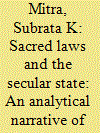

|
|
|
|
|
| Publication |
July 2002.
|
| Description |
99-130
|
| Summary/Abstract |
The continuing controversy over India's personal laws even after five decades of Independence is seen by many as indicative of its incomplete modernity and limited secularization. This article challenges such views in terms of two main arguments. First, it asserts that the debate on whether India should have one uniform civil law or many personal laws has made it possible for interests of different communities to be articulated and galvanized into positions. The second main argument of this article is to show, on the basis of an exegesis the cultural roots and historical path of the evolution of colonial legislation, the broad range of resources available in India for the institutionalization of a personal law regime. The convergence of positions both in the high politics of the state and the everyday politics of society points towards the plurality of personal laws as an optimal solution for orderly and democratic state-society relations in India.
|
|
|
|
|
|
|
|
|
|
|
|
|
|
|
|
| 5 |
ID:
046620
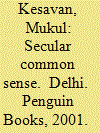

|
|
|
|
|
| Publication |
DelhI, Penguin Books, 2001.
|
| Description |
135p.
|
|
|
|
|
|
|
|
|
|
|
|
Copies: C:1/I:0,R:0,Q:0
Circulation
| Accession# | Call# | Current Location | Status | Policy | Location |
| 045879 | 211.6/KES 045879 | Main | On Shelf | General | |
|
|
|
|
| 6 |
ID:
056841


|
|
|
| 7 |
ID:
022614
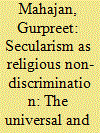

|
|
|
|
|
| Publication |
Jan 2002.
|
| Description |
33-53
|
| Summary/Abstract |
Secularism everywhere represents the ideal of religious non-discrimination, but different countries pursue different paths to realize this end. Beginning with this understanding, this article rejects narratives about the uniqueness of Indian society and its conception of secularism. It elucidates the foundational principles embodied in India's constitution and argues that India chose not to follow the policy of "separation." Like many countries in Europe, India pursued religious non-discrimination by ensuring equal liberty for all communities. However, what set India apart is that equal liberty for all communities was not accompanied by a parallel strong emphasis on individual liberty. The policy of equal religious liberty was an extension of the principle of equality of all communities in the public domain. This fundamental norm is today under siege from votaries of cultural majoritarianism. What is at stake in the present-day conflict therefore is not simply religious freedom of minorities but the commitment to equality of all.
|
|
|
|
|
|
|
|
|
|
|
|
|
|
|
|
| 8 |
ID:
026712
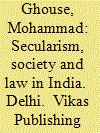

|
|
|
|
|
| Publication |
DelhI, Vikas Publishing House, 1973.
|
| Description |
viii, 254p.
|
|
|
|
|
|
|
|
|
|
|
|
Copies: C:1/I:0,R:0,Q:0
Circulation
| Accession# | Call# | Current Location | Status | Policy | Location |
| 011250 | 302.140945/GHO 011250 | Main | On Shelf | General | |
|
|
|
|
| 9 |
ID:
052594
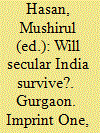

|
|
|
|
|
| Publication |
Gurgaon, Imprint One, 2004.
|
| Description |
399p.
|
| Standard Number |
8188861006
|
|
|
|
|
|
|
|
|
|
|
|
Copies: C:1/I:0,R:0,Q:0
Circulation
| Accession# | Call# | Current Location | Status | Policy | Location |
| 048338 | 320.954/HAS 048338 | Main | On Shelf | General | |
|
|
|
|